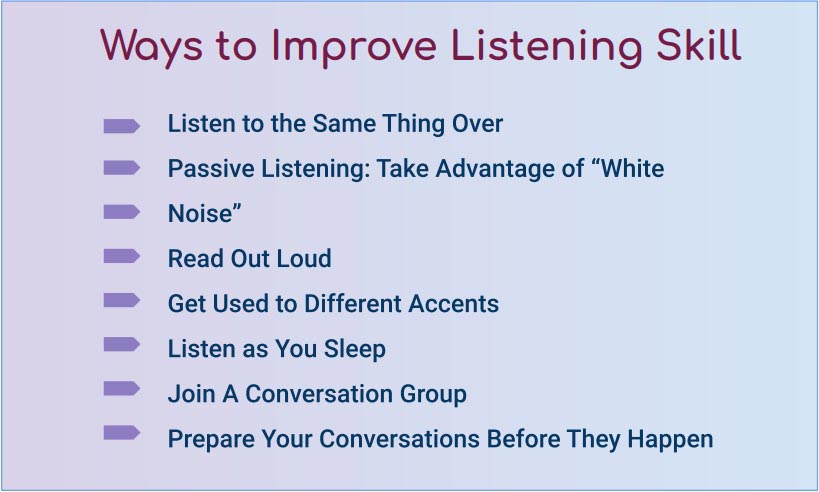Improving English Listening Skills: Practical Tips for Success
Introduction: Why Listening Skills Matter in English
English listening skills are crucial for mastering the language. Whether you’re a student preparing for exams, a professional in an English-speaking environment, or simply trying to improve your communication abilities, developing strong listening skills is essential. Good listening is the foundation for effective speaking, reading, and writing. It helps you understand others and express your thoughts clearly.
In this guide, we’ll explore practical strategies to enhance your English listening skills. From active listening techniques to listening practice resources, this article provides in-depth tips and suggestions.

1. Active Listening: The Key to Success
1.1 What is Active Listening?
Active listening involves fully concentrating on the speaker, understanding their message, responding thoughtfully, and remembering key information. It goes beyond just hearing words; it’s about engaging with the content and thinking critically about what’s being said.
-
Focus on the Message: Don’t just passively hear the words; actively think about the meaning behind them.
-
Minimize Distractions: Eliminate distractions around you to concentrate fully on the speaker.
1.2 How to Practice Active Listening
To practice active listening, you need to give your full attention to the speaker. Try these tips:
-
Maintain Eye Contact: This shows the speaker that you are engaged and interested.
-
Paraphrase: Summarize what the speaker said to ensure you understand their message. For example, “So, you’re saying that…”
-
Ask Questions: If you don’t understand something, don’t hesitate to ask for clarification.
2. Regular Listening Practice
2.1 Listen to English Content Daily
One of the best ways to improve your listening skills is through daily practice. Consistency is key. Listen to English podcasts, watch movies or TV shows in English, or follow YouTube channels dedicated to learning English.
-
Podcasts and Audiobooks: These are excellent resources, as they often come with different accents, speaking speeds, and topics.
-
Movies and TV Shows: Watch with subtitles at first and then try to watch without them to challenge your listening ability.

2.2 Use Language Learning Apps
There are plenty of language learning apps that focus on improving listening comprehension. Some popular apps include:
-
Duolingo: Offers bite-sized lessons that help you practice listening and understanding at various levels.
-
Babbel: Provides interactive listening exercises that are tailored to real-life conversations.
-
LingQ: Offers a huge library of English audio content with transcripts to help you practice.
3. Focus on Different Accents and Dialects
3.1 Exposure to Different English Accents
English is spoken all over the world, and there are many different accents and dialects to get accustomed to. Exposure to different accents will help you understand a wide range of speakers. Try listening to English speakers from different countries such as:
-
American English
-
British English
-
Australian English
Each accent has unique pronunciation and rhythm, and learning to understand them will help you become more flexible in listening.
3.2 Mimic the Accents
To improve your ability to understand different accents, try mimicking them. This will help you tune your ears to their specific sounds and intonations. You can repeat sentences from movies, podcasts, or YouTube videos, imitating the pronunciation and rhythm.
4. Improve Listening with Context
4.1 Use Visuals to Aid Understanding
Using visual aids while listening can improve your comprehension. For instance, if you’re watching a video, focus on the body language and facial expressions of the speaker. These cues can help you understand the context of what is being said.
-
Watch with Subtitles: Start by using subtitles in your native language, then switch to English subtitles as your comprehension improves.
-
Contextual Clues: Pay attention to the context in which the conversation is happening. This helps you understand words or phrases you may not know.
4.2 Listen and Take Notes
Taking notes while listening can help reinforce what you hear. Write down important details such as names, dates, or specific phrases that stand out. This will help you retain information and identify key themes in conversations.

5. Break Down the Listening Process
5.1 Start with Slow-Paced Audio
When you’re just starting out, listen to slow-paced English content. This will help you catch the pronunciation and intonation more easily. Once you’re comfortable, gradually move on to faster-paced content.
-
ESL Listening Websites: Websites like BBC Learning English and VOA Learning English offer slow-paced news segments and dialogues specifically designed for English learners.
5.2 Focus on Key Vocabulary
While listening, try to pick out and focus on key vocabulary. Familiarizing yourself with common phrases and expressions will help you understand more complex conversations. Additionally, make note of new words and their meanings.
-
Create Word Lists: Keep a notebook or a digital list of new words you encounter while listening.
-
Review Vocabulary: Regularly review these words to solidify your understanding.
6. Practice Listening for Specific Information
6.1 Target Specific Listening Skills
When you listen, focus on certain aspects of the conversation. This could be listening for specific information, like:
-
Dates and Numbers: Pay special attention to dates, phone numbers, and other important details.
-
Opinions: Listen for the speaker’s opinions or ideas on the topic being discussed.
6.2 Use Listening Exercises and Quizzes
To enhance your listening, consider using listening exercises designed for language learners. These quizzes test your comprehension and help you focus on extracting specific details from spoken content. Websites like Elllo.org provide listening practice exercises that cover a wide range of topics and accents.
7. Frequently Asked Questions (FAQs)
Q1: How can I improve my listening skills quickly?
A1: The best way to improve quickly is to practice every day. Start with slow-paced material and gradually challenge yourself with faster and more complex content. Also, make sure to engage in active listening by focusing on the speaker’s message and using visual aids.
Q2: What is the best way to improve my listening for the IELTS exam?
A2: To improve your IELTS listening, regularly practice with IELTS practice tests. Listen to podcasts, news reports, and other formal spoken materials. Practice listening for specific details, as well as general understanding, to mimic the test format.
Q3: Should I listen to English music to improve my listening?
A3: While music can help familiarize you with pronunciation and rhythm, it may not always be the best for comprehension. Focus on podcasts, news, or videos with clear speech to improve your listening skills more effectively.
Q4: Can I improve my listening skills without a tutor?
A4: Yes, it is entirely possible to improve without a tutor. Use online resources like podcasts, language learning apps, and YouTube channels. Practicing consistently and engaging with English content daily will make a significant difference.
Conclusion: Commit to Continuous Improvement
Improving your English listening skills takes time and effort, but the rewards are worth it. By practicing regularly, engaging in active listening, and using the right resources, you can make significant progress. Remember, listening is the foundation of language learning, and the more you practice, the better you will become at understanding and speaking English.
Start today by incorporating these tips into your learning routine and watch your listening skills improve!









